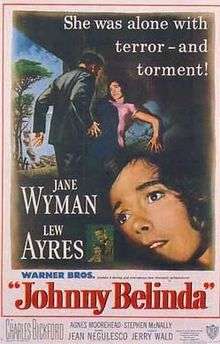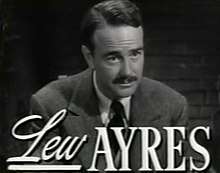Johnny Belinda (1948 film)
Johnny Belinda is a 1948 American drama film based on the 1940 Broadway stage hit of the same name, by Elmer Blaney Harris. The play was adapted for the screen by writers Allen Vincent and Irma von Cube, and directed by Jean Negulesco.
| Johnny Belinda | |
|---|---|
 Theatrical release poster | |
| Directed by | Jean Negulesco |
| Produced by | Jerry Wald |
| Screenplay by | Allen Vincent Irma von Cube |
| Based on | Johnny Belinda 1940 play by Elmer Blaney Harris |
| Starring | Jane Wyman Lew Ayres Charles Bickford Agnes Moorehead |
| Music by | Max Steiner |
| Cinematography | Ted McCord |
| Edited by | David Weisbart |
| Distributed by | Warner Bros. |
Release date |
|
Running time | 102 minutes |
| Country | United States |
| Language | English |
| Budget | $1,631,000[1] |
| Box office | $4.1 million (US/ Canada rentals)[2][3] or $6,987,000[1] |
The story is based on an actual incident that happened near Harris's summer residence in Fortune Bridge, Bay Fortune, Prince Edward Island. The title character is based on the real-life Lydia Dingwell (1852–1931), of Dingwells Mills, Prince Edward Island. The film dramatizes the consequences of spreading lies and rumors, and the horror of rape. The latter subject had previously been prohibited by the Motion Picture Production Code. Johnny Belinda is widely considered to be the first Hollywood film for which the restriction was relaxed, and as such was controversial at the time of its initial release.
The film stars Jane Wyman, Lew Ayres, Charles Bickford, Agnes Moorehead, Stephen McNally, and Jan Sterling. Wyman's performance earned her the Academy Award for Best Actress.
It was filmed on location in Fort Bragg, California.[4]
Plot
Belinda MacDonald is a deaf-mute young woman living on Cape Breton Island on the east coast of Canada. Belinda is befriended by Dr. Robert Richardson, the new physician who recently moved to town. The doctor realizes that, although she cannot hear or speak, Belinda is very intelligent. She lives on a farm with her father, Black MacDonald, and her aunt, Aggie MacDonald. She wears plain work clothes, rarely goes into town, and only once to church. The family sells farm goods to the nearby town, mainly flour. Her father and aunt called Belinda "Dummy" and resent her because her mother died giving birth to her. Dr. Richardson teaches Belinda sign language and the signs for many common things and ideas. Over time, his affection for her grows. He buys her a pretty dress and encourages her father to take her to town and church.
Dr. Richardson's secretary, Stella, is attracted to him and tries to get his attention, but the doctor does not reciprocate her feelings. After Stella figures out that he is becoming attracted to Belinda, she starts to resent both of them.
One of the family's customers, Locky McCormick, gets drunk at a dance, leaves the dance, and goes to the farm when Belinda is alone and rapes her. This results in her pregnancy, which is diagnosed by another doctor to whom Dr. Richardson had brought her for audiology testing. Belinda gives birth at home to a healthy baby boy, whom she names Johnny. The people in town begin to shun the MacDonald family and Dr. Richardson, as they suspect he is the father of Belinda's child because he has spent a lot of time with her. Dr. Richardson tells Black that he is willing to marry Belinda in order to quiet town gossip. Black rejects this idea, as he knows that Dr. Richardson does not truly love Belinda, but merely pities her.
Locky goes to the MacDonald farm under the pretense of purchasing ground barley, but really wants to get a look at baby Johnny. When Black sees him, he orders Locky to leave. Locky inadvertently implies to Black that he is the father of the child. Black follows Locky and threatens to expose him to the town. They have a fight on a seaside cliff and Locky throws Black off the cliff into the sea, killing him.
Belinda and her aunt Aggie try to operate the farm but they are struggling to pay the bills and keep the farm running. The town, at the urging of Locky, has a meeting and declares Belinda "unfit" to care for the child. When Locky and Stella (who by now are married) come to take Johnny, Belinda first makes Stella realize that she is smarter than the townspeople have given her credit for. She also makes it clear by gestures that she will not give up her baby without a fight. Stella confronts Locky, who confesses that the child is his. When he goes to retrieve the baby, he overcomes Belinda's efforts to stop him, managing to make his way upstairs to the room where Johnny is. However, before Locky can unlock the door, Belinda uses a shotgun to shoot and kill Locky. Belinda is arrested and goes on trial for murder. At the trial, Dr. Richardson testifies that she was protecting her property and family. The court dismisses this as the doctor's love for her, and is ready to sentence Belinda to execution, but finally Stella blurts out that her husband Locky had confessed the truth about the rape to her on the day he was killed. Belinda is set free, and she, Johnny, and Dr. Richardson leave together.
Main cast and characters
 Jane Wyman
Jane Wyman
as Belinda MacDonald Lew Ayres
Lew Ayres
as Dr. Robert Richardson Charles Bickford
Charles Bickford
as Black MacDonald Agnes Moorehead
Agnes Moorehead
as Aggie MacDonald
Other cast members
- Stephen McNally as Locky McCormick
- Jan Sterling as Stella McCormick
- Rosalind Ivan as Mrs. Poggety
- Dan Seymour as Pacquet
- Mabel Paige as Mrs. Lutz
- Alan Napier as Defense Attorney
- Barbara Bates as Gracie Anderson
- Monte Blue as Ben
- James Craven as Interpreter
- Franklyn Farnum as Man on Jury
- Al Ferguson as Man Reciting Lord's Prayer
- Frank Hagney as Man Reciting Lord's Prayer
- Creighton Hale as Bailiff
- Jonathan Hale as Dr. Horace M. Gray
- Lew Harvey as Man Reciting Lord's Prayer
- Holmes Herbert as The Judge
- Douglas Kennedy as Mountie
- Colin Kenny as Man Reciting Lord's Prayer
- Snub Pollard as Man on Jury
- Richard Walsh as Fergus McQuiggen
- Ian Wolfe as Rector
- Ida Moore as Mrs. McKee
- Frederick Worlock as Prosecutor
- Charles Horvath as Church Attendant
- Blayney Lewis as Dan'l
- Alice MacKenzie as Farm Woman
- Larry McGrath as Man Reciting Lord's Prayer
- Ray Montgomery as Tim Moore
- Jeff Richards as Floyd McQuiggen
- Joan Winfield as Mrs. Tim Moore
Reception
Box office
The film was a huge financial success, earning $4,266,000 domestically and $2,721,000 foreign.[1]
Critical
Contemporary reviews were positive. Bosley Crowther of The New York Times wrote that while some of the scenes "were pretty lurid, especially towards the end," that "the best of the film is absorbing, and Miss Wyman, all the way through, plays her role in a manner which commands compassion and respect."[5] Variety called it "somber, tender, [and] moving," with Wyman's performance "a personal success."[6] John McCarten of The New Yorker thought the screenplay was "far superior" to the script of the original play, and that the actors were "all convincing, particularly Jane Wyman, who is cast as the badgered heroine."[7] The Monthly Film Bulletin called it "a memorable film in which Jane Wyman's performance as Belinda is outstanding."[8] "A powerful dramatic entertainment," wrote Harrison's Reports. "The direction, acting, and photography are of a superior quality, but the outstanding thing about the picture is the exceptionally fine performance by Jane Wyman, an acting job that will undoubtedly make her a foremost contender for the Academy Award."[9]
The film was the second most popular movie at the British box office in 1948.[10]
Content aggregator Rotten Tomatoes reports an 89% "Fresh" rating based on 8 out of 9 surveyed critics giving the film a positive review.[11]
The film is recognized by American Film Institute in these lists:
- 2005: AFI's 100 Years of Film Scores – Nominated[12]
Awards
Wins:[13]
- Winner – Golden Globe Award for Best Actress – Motion Picture Drama – Jane Wyman
- Winner – Photoplay Awards Most Popular Female Star – Jane Wyman
- Winner – Golden Globe Award for Best Motion Picture (tied with The Treasure of the Sierra Madre before the Best Picture Golde Globe was split into Drama and Musical or Comedy categories)
21st Academy Awards
| Award | Result | Nominee[14] |
|---|---|---|
| Best Motion Picture | Nominated | Warner Bros. (Jerry Wald, Producer) |
| Best Director | Nominated | Jean Negulesco |
| Best Actor | Nominated | Lew Ayres |
| Best Actress | Won | Jane Wyman |
| Best Writing, Screenplay | Nominated | Irma von Cube and Allen Vincent |
| Best Supporting Actor | Nominated | Charles Bickford |
| Best Supporting Actress | Nominated | Agnes Moorehead |
| Best Art Direction-Set Decoration (Black-and-White) | Nominated | Robert Haas and William Wallace |
| Best Cinematography (Black-and-White) | Nominated | Ted McCord |
| Best Film Editing | Nominated | David Weisbart |
| Best Music (Music Score of a Dramatic or Comedy Picture) | Nominated | Max Steiner |
| Best Sound Recording | Nominated | Nathan Levinson |
Later versions
The film was remade first as a 1967 television movie starring Mia Farrow as Belinda, Ian Bannen as her doctor, and David Carradine as the rapist, and in 1982 as another TV remake with Rosanna Arquette as Belinda and Richard Thomas as the VISTA worker. Also, live versions aired on the US network NBC on October 13, 1958 as part of the Hallmark Hall of Fame series[15] and on Australian television in 1959 as part of the Shell Presents series.[16]
References
- Warner Bros financial information in The William Shaefer Ledger. See Appendix 1, Historical Journal of Film, Radio and Television, (1995) 15:sup1, 1-31 p 29 DOI: 10.1080/01439689508604551
- "All-Time Top Grossers", Variety, 8 January 1964 p 69
- "Top Grossers of 1948", Variety 5 January 1949 p 46
- Landazuri, Margarita. "Johnny Belinda (1948)". tcm.com. Turner Classic Movies. Retrieved 3 March 2017.
- Crowther, Bosley (October 2, 1948). "The Screen in Review". The New York Times: 11.
- "Johnny Belinda". Variety: 15. September 15, 1948.
- McCarten, John (October 9, 1948). "The Current Cinema". The New Yorker: 111–112.
- "Johnny Belinda (1948)". The Monthly Film Bulletin. 15 (177): 128. September 1948.
- "'Johnny Belinda' with Jane Wyman, Lew Ayres and Charles Bickford". Harrison's Reports: 151. September 18, 1948.
- "The Third Man As Popular Film Of Year". The Sydney Morning Herald. National Library of Australia. 16 December 1949. p. 3. Retrieved 4 March 2013.
- "Johnny Belinda". Rotten Tomatoes. Retrieved May 16, 2018.
- "AFI's 100 Years of Film Scores Nominees" (PDF). Retrieved 2016-08-06.
- "NY Times: Johnny Belinda". NY Times. Retrieved 2008-12-20.
- "The 21st Academy Awards (1949) Nominees and Winners". oscars.org. Retrieved 2011-08-18.
- "Broadcasting Magazine" (PDF). 20 October 1958. Retrieved 1 January 2017 – via americanradiohistory.com.
- "The Sydney Morning Herald - Google News Archive Search". news.google.com. Retrieved 14 May 2018.
External links
| Wikimedia Commons has media related to Johnny Belinda (film). |